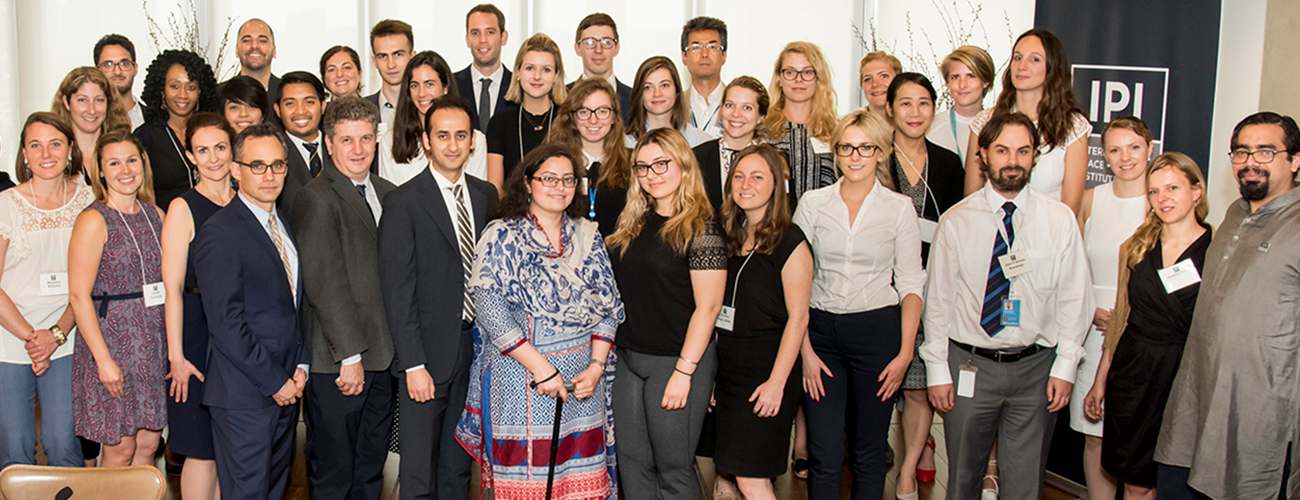An expert group of diplomats, UN officials, and representatives from civil society organizations were convened for the 2017 edition of the annual IPI New York Seminar, held on June 21, 2017. They met to discuss the role of youth leadership for peace and development, in the context of the 2030 Agenda for Sustainable Development, as well as the Security Council resolution on “Youth, Peace and Security” adopted in December 2015.
The event was organized in association with the Permanent Mission of Ireland to the United Nations. Ambassador David Donoghue, Ireland’s Permanent Representative to the UN, delivered opening remarks.
Mr. Donoghue described the theme for the seminar as very timely and a subject that Ireland considers to be critically important. He noted that young people under the age of 25 make up almost half of the world’s population today. That demographic fact alone means that youth have to be the focus of policy—it will be impossible, for instance, to achieve the Sustainable Development Goals (SDGs) without the involvement of young leaders. The process of drafting and adopting the SDGs itself incorporated significant opportunities for consultation with youth, and the enthusiastic response to these consultations reflected the awareness among youth themselves that the 2030 Agenda was a youth agenda.
Dr. Graeme Simpson, Director of Interpeace USA and lead author of the progress study (commissioned under Security Council Resolution 2250) on youth, peace, and security, delivered the keynote speech. He described the methodology adopted by the progress study, which was designed while keeping in mind the imperative of not replicating the very problems it was looking into—what the resolution describes as a “deep and enduring pattern of exclusion of young people.” The progress study has attempted to model a different approach that incorporates youth and their priorities at every stage of design and implementation and has gone to great lengths to hold consultations with various groups of young people globally.
The subsequent sessions of the seminar were conducted under the Chatham House rule of non-attribution. Participants reviewed the strategies for youth engagement adopted by various entities within the UN system, identifying the lessons learned from current practices, including where they still fell short or faced challenges achieving the desired level of inclusion. They also heard from young leaders of peacebuilding organizations working in a range of countries, who discussed their experiences with catalyzing change and interacting with national and international policymaking bodies.
In these sessions, participants highlighted the prevailing degree of mistrust and disillusionment among young people, who often see existing systems as flawed and in need of reform. It will be difficult to move past these impressions if local or national authorities and intergovernmental organizations are seen as continuing to patronize youth and minimize their concerns; rather, it will be necessary for political and policy-level actors to recognize the agency of youth not only to participate in or benefit from but also to design and lead the processes of development and peacebuilding.
In order to explore the practical and programmatic implications of these ideas, seminar participants then split into working groups. Each group was assigned a hypothetical scenario in one of three countries and asked to design interventions to respond to those situations while keeping in mind the principles enumerated in the previous discussion. This exercise helped make those insights more concrete, while also leading participants to appreciate the importance of deep local knowledge and analysis. Rapporteurs for each of the working groups then presented their proposals back to the plenary and received feedback on their proposals from a panel including leaders with extensive experience of UN grant-making to civil society organizations.
Finally, the participants expressed their appreciation for the emphasis UN Secretary-General António Guterres has placed on youth in his tenure thus far and their hope that he would take up and sincerely pursue the lessons and recommendations that emerge from the progress study.








